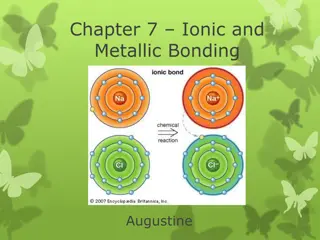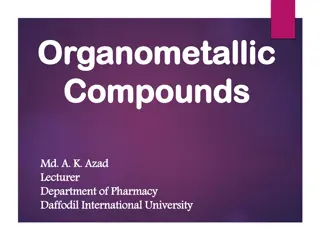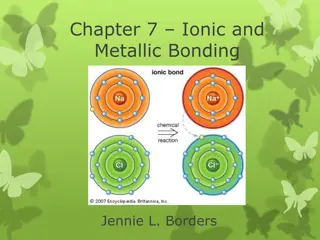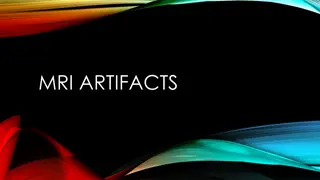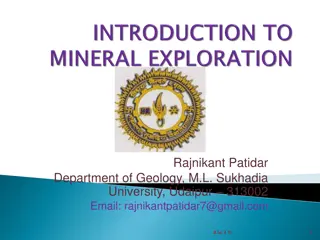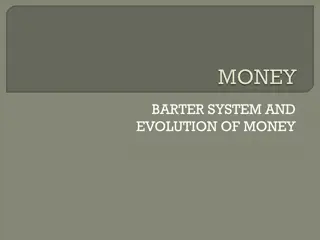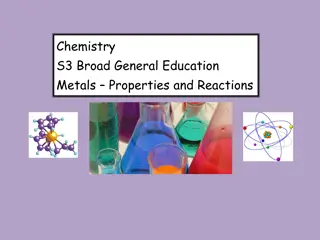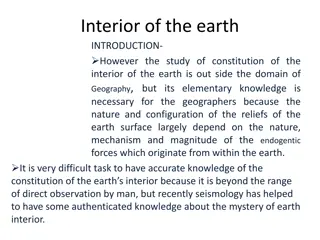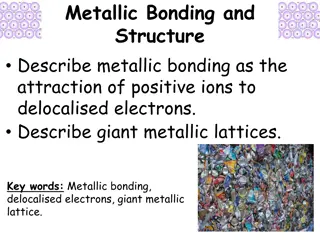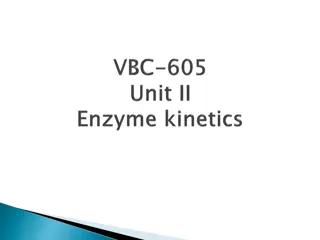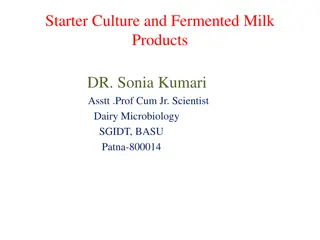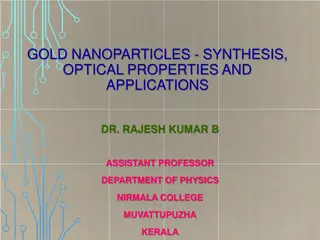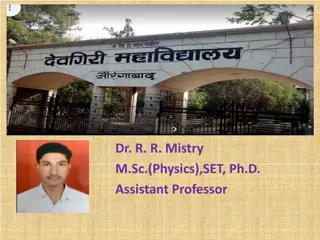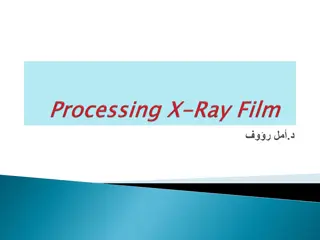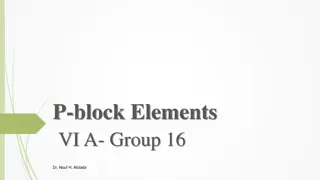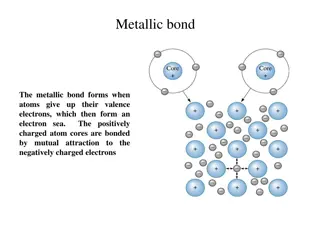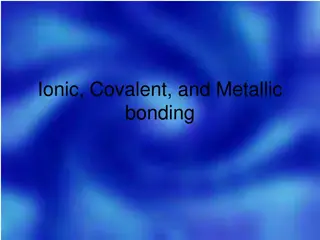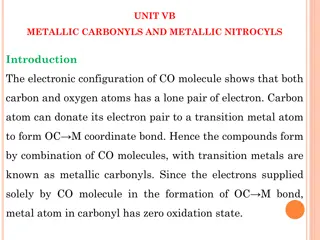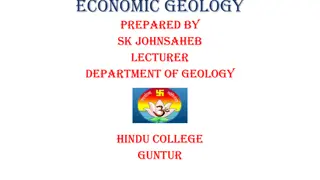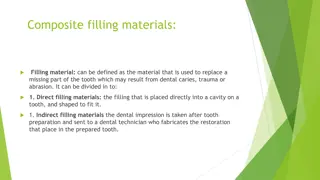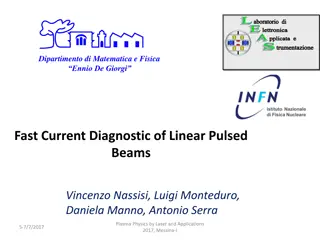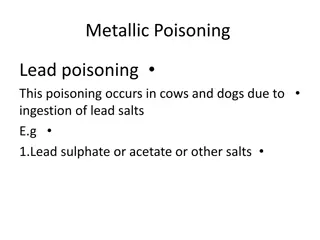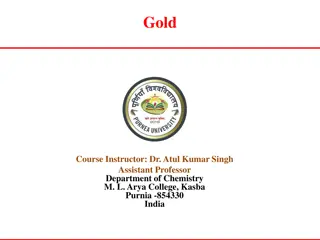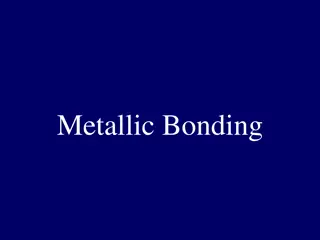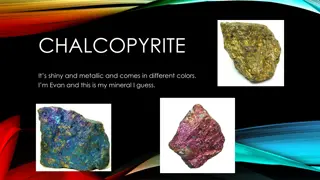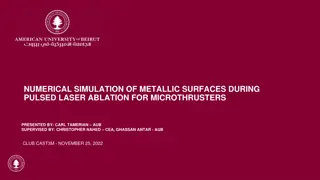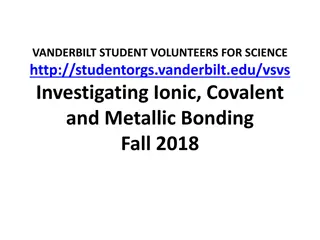Understanding Terrestrial Planets and Core Dynamics
Exploring the core-mantle interaction from the early Hadean period to present times reveals intriguing questions about the outer core's electrical conductivity, geodynamo sustainability, and inner core characteristics. Studies indicate challenges in maintaining the geodynamo, potential heat sources
9 views • 48 slides
Understanding Ionic and Metallic Bonding: Valence Electrons, Octet Rule, and Ion Formation
Explore the essential concepts of ionic and metallic bonding, focusing on valence electrons, electron dot structures, the octet rule, cations, anions, and ion formation. Discover how atoms achieve stability through electron transfer, and learn to write electron configurations for various ions.
9 views • 52 slides
Revolutionising Metal Pitting Repair for Your Vacuum Pumps
In industrial maintenance, the battle against metal pitting and other forms of mechanical damage is ongoing. Rezitech approaches this challenge by offering a groundbreaking solution using Belzona metallic polymers.\n\nThese high-performance solutions are specifically designed to repair and rebuild m
3 views • 5 slides
Understanding Ionic and Metallic Bonding in Chemistry
Explore the concepts of ionic and metallic bonding in chemistry through discussions on valence electrons, electron dot structures, the octet rule, cations, anions, and more. Dive into the world of ions and electron configurations to understand how atoms achieve stability through the gain or loss of
3 views • 62 slides
Winnerslabels - License plate stamping foil manufacturer in Asia, India
A hot stamping foil process involves the application of heat and pressure on metallic foil surfaces or holograms onto other materials such as carton board, laminated board, plastics and other corrugated board products.\n\nA hot stamping foil process comprises embossing, holographic application, comb
4 views • 3 slides
Winners Labels- Use Custom Hot Foil Stamping for Glass Containers
What Is Hot Foil Stamping?\nHot foil stamping is the process of using pressure & heat to apply metallic foil to various kinds of containers for decoration and product labeling. It works on cardboard, paper, corrugated board, glass, plastic sheets, and many other types of materials. Hot foil stamping
3 views • 3 slides
Understanding Organometallic Compounds and Their Applications
Organometallic compounds are compounds with a bond between a metallic element and a carbon atom from an organic molecule. They have diverse properties and applications, ranging from being toxic to facilitating commercial chemical reactions. Learn more about their preparation, properties, and various
0 views • 10 slides
Understanding Ionic and Metallic Bonding in Chemistry
Explore the concepts of ions, electron dot structures, the octet rule, cations, and anions in Chapter 7. Learn how elements achieve stability through electron configurations, and practice writing electron dot structures and naming ions. Understand the differences between cations and anions and how t
1 views • 52 slides
Luxury Garage Flooring
Our floors are not only beautiful but built to last and simple\u00ad to care for. So, if you're kee\u00adn on a garage space that's more than ordinary, our supe\u00adrb flooring can help. Be it shiny concrete\u00ad, luxury garage flooring, or ele\u00adgant metallic ones, we've\u00ad got them all. Bu
0 views • 5 slides
Modern Elegance Latest Saree Trends with Innovative Fabrics.pdf
In the ever-evolving world of sarees, innovative fabrics like metallic silk organza, shimmer organza, georgette ombre, and copper foil power mesh are redefining traditional elegance with contemporary flair. Each fabric brings its unique charm. Go for
0 views • 6 slides
Understanding MRI Artifacts: Causes and Examples
MRI artifacts are signal misrepresentations that can be caused by various factors such as patient movement, magnetic field inhomogeneity, metallic objects, and under-sampling. Motion artifacts, magnetic susceptibility artifacts, and aliasing/wrap-around artifacts are common types of artifacts that c
2 views • 7 slides
Understanding Minerals, Rocks, and Ores in Geology Studies
Exploring the world of geology, this content delves into minerals as inorganic substances with specific compositions, rock formations of various origins, and ore classifications encompassing metallic, noble, industrial, gemstone, and fuel resources. It covers the definitions, characteristics, and cl
0 views • 19 slides
Evolution of Money: From Barter to Electronic Banking
Money has evolved from the barter system to electronic banking through various stages like animal money, metallic money, paper money, and credit money. The invention of money was crucial to overcome the limitations of barter, leading to the ideal utilization of resources and solving issues like the
0 views • 14 slides
Understanding Metals: Properties, Reactions, and Applications
Metals exhibit unique properties such as conductivity, metallic bonding, and reactivity with acids. They can be combined to form alloys with enhanced characteristics. This overview covers the properties, reactions, and utility of metals in various applications, providing insights into their behavior
2 views • 50 slides
Understanding the Composition of Earth's Interior: Insights from Density, Pressure, and Temperature
The constitution of the Earth's interior plays a crucial role in shaping the surface features we observe. Although direct observation is challenging, seismic studies offer valuable insights. The density, pressure, and temperature within the Earth provide essential clues to its composition. Rocks' de
0 views • 14 slides
Understanding Metallic Bonding and Giant Metallic Lattices
Metallic bonding involves the attraction of positive metal ions to delocalized electrons, forming giant metallic lattices. In this structure, positive metal ions occupy fixed positions while electrons move freely throughout. This bonding is different from covalent bonding as it is delocalized, leadi
1 views • 19 slides
Factors Affecting Enzyme Activity and Catalysis
Enzyme activity is influenced by various factors such as enzyme concentration, temperature, pH, substrate concentration, inhibitors, activators, and physical agents. The rate of enzyme-catalyzed reactions is directly proportional to enzyme concentration, and temperature plays a significant role with
0 views • 23 slides
Iron Man's Metallic Menu Creations
Design a unique menu tailored to The Iron Man's tastes, featuring dishes like Metal Meatballs in a rustic Bolognese sauce sprinkled with iron filings, Mini surprises of mouth-watering mini cars filled with galvanized steel, and an Iron Ice-Cream topped with metallic sauce. Utilize alliteration, adje
0 views • 7 slides
Understanding Starter Culture Defects in Fermented Milk Products
Common problems with starter cultures in fermented milk products include insufficient acid and flavor production, as well as various defects like sharp acid taste, malty flavor, metallic flavor, green flavor, flat flavor, and bitterness. Factors contributing to these issues range from milk quality t
1 views • 9 slides
A Comprehensive Guide to Gradients
Gradients are versatile tools in design, allowing shapes to transition smoothly between colors. Learn about gradient types, preset options, creating your own metallic gradients, and applying gradients effectively in this detailed guide. Explore linear and radial gradient directions, understand gradi
0 views • 7 slides
Interactive GCSE Chemistry Lesson on Metals and Non-Metals
Engage in a dynamic one-hour lecture focusing on metals and non-metals in GCSE Chemistry. Discover the properties of metals and non-metals, understand the metallic bond, and explore the periodic table. Participate in tasks of varying difficulty levels, discuss statements related to metals and non-me
0 views • 17 slides
Recent Advances in Gold Nanoparticles and Nanofluids Synthesis and Applications
Gold nanoparticles (AuNPs) and nanofluids are attracting significant interest due to their unique properties and diverse applications. This article discusses the synthesis methods, optical properties, and applications of gold nanoparticles, as well as the preparation techniques and characteristics o
2 views • 8 slides
G.P. Thomson's Experiment: Confirmation of Matter Wave Nature of Electrons
The experiment conducted by G.P. Thomson in 1928 confirmed the matter wave nature of electrons through diffraction patterns obtained when high-speed electrons were diffracted from a thin metallic film. The setup involved accelerating electrons through a high potential, incident on a gold foil, and t
0 views • 6 slides
Understanding X-Ray Film Processing Techniques
When a beam of photons exposes an X-ray film, it chemically alters the silver halide crystals, creating a latent image. Film processing involves developer, fixer, and a series of steps to convert the latent image into a visible radiographic image. The developer reduces silver ions in exposed crystal
0 views • 26 slides
Case Study: Management of Haemothorax Complicated by Pneumonia in a 62-Year-Old Patient
A 62-year-old patient with a history of COPD, AF, and metallic AVR on warfarin presented with left-sided chest pain and breathlessness. Initially diagnosed with a pleural effusion, subsequent imaging revealed a complicated parapneumonic effusion/empyema. Despite initial drainage and treatment, the p
0 views • 19 slides
Overview of Group 16 P-Block Elements
Group 16 P-Block Elements, also known as Group VIA or Chalcogens, include oxygen, sulfur, selenium, tellurium, and polonium. These elements exhibit varying properties from non-metallic to semi-metallic to metallic. The group shows a general trend of increasing metallic properties down the group, alo
0 views • 26 slides
Understanding Electrochemistry in Engineering Chemistry
Electrochemistry in engineering chemistry explores the interactions between electrical and chemical energy, involving the conversion of energy forms. It discusses electrical conductors, insulators, metallic conductors, good conductors, semiconductors, and electrolytic conductors. The concept of elec
4 views • 56 slides
Understanding Different Types of Chemical Bonds
Metallic bonds involve atoms giving up valence electrons to form an electron sea, covalent bonds entail electron sharing to fill outer orbitals, ionic bonds form when atoms with different electronegativities attract, Van der Waals bonds include London forces between atoms, and hydrogen bonds occur i
0 views • 6 slides
Understanding Bonding in Chemistry
Delve into the world of chemical bonding through ionic, covalent, and metallic bonds. Explore how elements form bonds, from the attraction between sodium and chloride ions to the sharing of electrons in covalent bonds. Witness the formation of compounds like sodium chloride and magnesium oxide, unde
1 views • 12 slides
Overview of Metallic Carbonyls and Metallic Nitrocyls
Metallic carbonyls and metallic nitrocyls are compounds formed by the combination of CO molecules with transition metals. These compounds have unique bonding characteristics due to the lone pair of electrons present in the CO molecule. Metallic carbonyls are classified based on the number of metal a
0 views • 40 slides
Understanding Economic Geology: A Comprehensive Overview
Economic geology, as discussed in the provided content, delves into the commercial and industrial utilization of Earth's resources. Covering topics such as mineral deposits, ores, gangue minerals, common economic minerals, and classification of mineral deposits, this field plays a crucial role in id
0 views • 33 slides
Understanding Composite Filling Materials in Dentistry
Composite filling materials are used to replace missing parts of a tooth caused by dental issues. The materials can be direct or indirect, each with specific requirements for ideal performance. Metallic and non-metallic classifications exist, with considerations such as thermal insulating properties
0 views • 18 slides
Fast Current Diagnostic Techniques for Linear Pulsed Beams
Explore the advancements in plasma physics and beam diagnostics presented at the Plasma Physics by Laser and Applications conference in Messina. Through detailed talks and images, the evolution of Rogowski coils for linear structures, apparatus calibration, and results are showcased. Discover the ap
0 views • 12 slides
Understanding Metallic Poisoning in Animals: Lead and Mercury
Metallic poisoning, specifically lead and mercury poisoning in animals, can result from ingestion of lead salts or mercury compounds. Symptoms, effects on the body, absorption, excretion, and treatment methods for these toxicities are discussed in detail to enhance awareness and understanding of the
0 views • 40 slides
The Resilience of Free Metallic Gold in Nature and Its Value
Metallic gold found in nature has always been cherished for its chemical resistance and noble properties. It is highly prized for its enduring quality and scarcity, making it a sought-after element in various applications.
0 views • 10 slides
Understanding Chemical Bonds: Covalent, Ionic, and Metallic
Explore the fascinating world of chemical bonds, including covalent bonds where atoms share electron pairs (e.g., water), ionic bonds where oppositely charged ions attract (e.g., sodium chloride), and metallic bonds formed between positively charged atoms sharing free electrons (e.g., copper wire).
0 views • 6 slides
Understanding Metallic Bonding and Its Properties
Metallic bonding involves the delocalization of electrons among metal atoms, creating a unique structure known as the electron sea. This structure allows for properties such as high melting points, conductivity of heat and electricity, malleability, and ductility. Metals are able to conduct heat and
0 views • 12 slides
All About Chalcopyrite: A Shiny Metallic Mineral
Shiny and metallic, chalcopyrite is a mineral that comes in various colors, with a brass-yellow appearance and often an iridescent tarnish. Forming in igneous and metamorphic rocks, it is commonly found alongside other copper sulfide minerals. Chalcopyrite is a primary ore mined for copper, known fo
0 views • 7 slides
Numerical Simulation of Metallic Surfaces During Pulsed Laser Ablation for Microthrusters
This study explores the numerical simulation of metallic surfaces undergoing pulsed laser ablation for microthrusters. Carried out by Carl Tamerian from AUB under the supervision of Christopher Nahed from CEA and Ghassan Antar from AUB, the research delves into the underlying physics of laser ablati
0 views • 19 slides
Understanding Bonding in Ionic, Covalent, and Metallic Compounds
Explore the concepts of ionic, covalent, and metallic bonding through an investigation conducted by Vanderbilt Student Volunteers for Science. Learn about the different types of bonding, properties of ionic and molecular compounds, and the conductivity of metals. Discover the importance of determini
0 views • 15 slides

